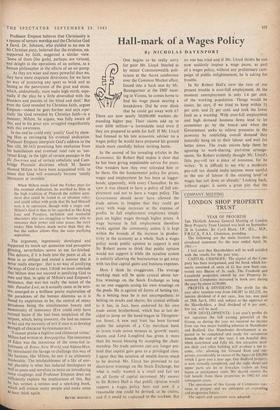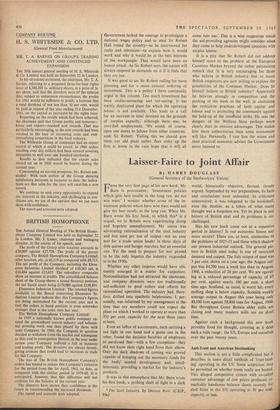Hall-mark of a Wages Policy
By NICHOLAS DAVENPORT
In the second of his revealing articles in the Economist, Sir Robert Hall makes it clear that he has been giving unpalatable advice for years. One wonders how they ever tolerated him or he them. On the fundamental policy for prices, wages and employment he has been at logger- heads, apparently, with every Chancellor. In his view it was absurd to have a policy of full em- ployment and not to have a wages policy. The Government should never have allowed the trade unions to imagine that they could get away with wage increases at the expense of profits. In full employment employers simply pass on higher wages through higher prices. A wage increase in full employment therefore works against the community unless it is kept within the bounds of the increase in produc- tivity in the economy as a whole. Such a wages policy needs public opinion to support it and Sir Robert seems to think that public opinion would not support it while the taxation system is unfairly allowing the businessman to get away with tax-free capital gains and business expenses.
Here I think he exaggerates. The average working man will be quite cynical about tax- free winnings on the Stock Exchange as long as no one suggests taxing his own winnings on the pools. He is against all forms of betting tax. As a betting man he is not unsympathetic to betting on stocks and shares; his cynical attitude to it has, in fact, been endorsed by his own trade union brotherhood, which has at last de- cided to jump on the band-wagon in Throgmor- ton Street. A new unit trust has been formed under the auspices of a City merchant bank to invest trade union moneys in 'growth' equity shares and Lord Longford has given it more than his moral blessing by accepting the chair- manship. No trade unionist can any longer pre- tend that capital gain goes to a privileged class. I agree that'the taxation of wealth leaves much to be desired. Mr. Lloyd has promised to tax short-term winnings on the Stock Exchange, but what is really wanted is a small and fair tax on all forms of capital increment. My answer to Sir Robert Hall is that publre opinion would support a wages policy here and now if a reasonable one could be devised, as he claims, and if it could he explained to the workers. But no one has tried and if Mr. Lloyd thinks he can now suddenly impose a wage pause, as part of a wages policy, without any preliminary cam- paign of public enlightenment, he is asking for trouble.
In Sir Robert Hall's view the root of our present trouble is over-full employment. At the moment unemployment is only 1.4 per cent. of the working population. Things would be easier, he says, if we tried to keep within lf per cent. and 21 per cent. and took the lower limit as a warning. With over-full employment and high demand business firms tend to let economies go by the board and when the Government seeks to relieve pressures in the economy by restricting overall demand they naturally hang on to their labour and wait for better times. The trade unions help them by agreeing to work-sharing, part-time arrange- ments. Sir Robert evidently thought Mr. Lloyd's little pay-roll tax a piece of nonsense, for he writes : 'It is difficult to see why a moderate pay-roll tax should make anyone more careful in the use of labour if the existing level of wages has not done so already.' Looking back, without anger, it seems a great pity that the Government lacked the courage to promulgate a national wages policy and to send Sir Robert Hall round the country—to be interviewed for radio and television—to explain how it would work and why it would be in the best interests of the workpeople. That would have been an honest attack. As Sir Robert says, the nation will always respond to demands on it if it feels that they are just.
It was good to see Sir Robert calling for more planning and for a more rational ordering of investment. This is a policy 1 have continually urged in this column Too much investment has been undiscriniinating and tax-saving; it has merely duplicated plant for which the operating labour is not available. This leads to a call tor an increase in total demand on the grounds of 'surplus capacity,' although there may he over-full employment. 'We could, of course, open our doors to labour from other countries,' adds Sir Robert. 'Failing this we should give them our old plant rather than stoke up the fires at home in the vain hope that it will all come into use.' This is a wise suggestion which the aid-providing agencies might consider when they come to help underdeveloped countries with surplus labour.
It is a pity that Sir Robert did not address himself more to the problem of the European Common Market beyond the rather patronising remark that 'it is very encouraging for those who believe in British industry that so many British employers are now willing to explore the possibilities of the Common Market. Does he himself believe in British industry? Apparently he believes strongly in competition and the pushing of the weak to the wall, in abolishing the restrictive practices of both capital and labour and in protecting the community against the hold-up of the unofficial strike. He sees the dangers of the Welfare State perhaps more clearly than its obvious advantages. This makes him more authoritarian than some economists will like. Personally. 1 rate him the wisest and most practical economic adviser the Government never listened to.







































 Previous page
Previous page